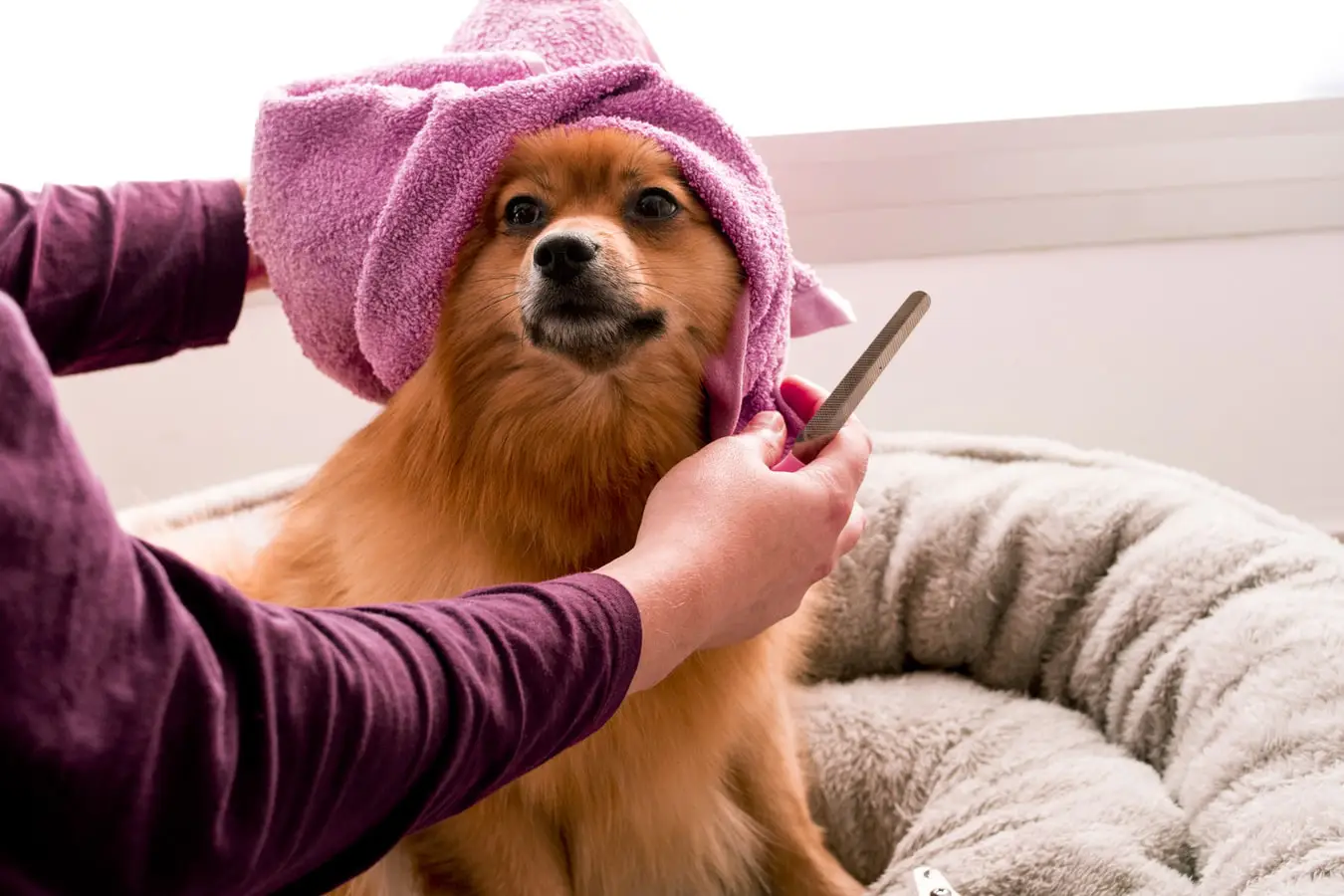Having a dog comes with many responsibilities. You have to vaccinate him, feed him nutritious meals, walk him, and so on.
If that wasn’t everything – dogs can get ill or allergic to various things. Most people aren’t aware of all the things your dog can be allergic to but the truth is, dogs can be allergic to almost everything, just like humans.
For example, did you hear of the dog allergy to shampoo? It’s quite common, but most people haven’t heard of it.
So, what is the dog allergy to shampoo? How can you treat this allergy and how can you prevent it from happening? Read our article to find out all about it!
What Is The Dog Allergy To Shampoo?
What is the allergy to shampoo? Well, if your dog gets an allergic reaction to shampoo, that means he has a contact allergy to shampoo. Believe it or not, it’s one of the most common dog allergies.
Generally speaking, contact allergies appear as an aggressive response of the immune system to the allergen. Special immune cells react to the allergen and create an allergic reaction as you see it.
When that allergen comes in contact with the immune cells, it activates the immune system. As a response, the immune system makes a protein that causes the production of histamine in those special immune cells.
Histamine is a natural compound of the immune system, and it has an inflammatory effect on the tissue it comes into contact with. So, dog shampoos can contain various ingredients that can irritate the dog’s skin or even cause an allergic reaction.
If some of the ingredients aren’t agreeing well with your dog, his immune system will react almost immediately after exposure. The reaction will become more severe if the dog is exposed often to the ingredient that causes a flare-up.
Simply said, an allergy to shampoo is a strong reaction of the immune system to a protein in the shampoo. The canine immune system recognizes that protein as an intruder and is trying to fight against it.

What Are The Symptoms Of The Dog’s Allergy To Shampoo?
There are many different symptoms of shampoo allergy in dogs. Contact allergies are usually just uncomfortable, but they can lead to anaphylactic shock.However, if you notice any of the following symptoms, take your dog to the nearest veterinarian. The most common symptoms of the dog’s allergy to shampoo are:
- Hives
- Ulcerations on skin
- Skin rashes and skin infections
- Blistery lesions
- Bald patches
- Chronically inflamed feet
- Swelling, especially around the face and neck
- Paw biting
- Obsessive licking
- Face rubbing and head shaking
- Chronic ear infections
Do keep in mind that if you see that your dog has swelling around the muzzle or the eyes (or both), you should take him to the emergency animal clinic. Also, if you see that your dog has trouble breathing, that he is gasping for air, that he got rapid-onset diarrhea, or is vomiting, take him to the vet or the emergency clinic as soon as possible.
What Causes The Shampoo Allergy?
Preservatives: 2-Bromo-2-nitropropane-1,3-diol, Benzyl alcohol, DMDM hydantoin, Imidazolidinyl urea
- Methylisothiazolinone
- Foam boosters and stabilizers: Cocamide MEA, Cocamide DEA
- Cetyl alcohol and Stearyl alcohol
- Petrolatum
- Essential oils
- Limonene
How To Diagnose Dog Allergy To Shampoo?
If you suspect that your dog has an allergic reaction to anything, not just shampoo, you should always take him to the vet. Never attempt to diagnose the dog yourself if you are not a licensed professional.
So, the general physical exam should make the symptoms of the allergy more prominent. If the vet suspects that the issue in question is a contact allergy, they will take a skin scraping.
The skin scraping will be examined by cutaneous cytology. Cutaneous cytology is a microscopic evaluation of the skin cells, and it’s done to reveal any issues like a yeast infection or the presence of mites.
So, the allergy to the shampoo ingredients can happen anywhere on the canine body. However, true allergic reactions will appear on the face, neck, or groin. Other common places are under the front legs and between the toes. The vet will examine all those places to rule out potential skin irritations.
The time of the aggressive response of the dog’s immune system and other symptoms that have occurred can help the vet create a preliminary diagnosis. However, the vet will likely recommend doing a patch test – also commonly known as an intradermal skin test.
The intradermal skin test consists of injecting minuscule amounts of the suspected antigens. This test is done to induce a local reaction of the immune system.

If the vet suspects that the shampoo is causing a reaction – they will introduce antigens from ingredients commonly found in shampoo and other grooming products. However, do keep in mind that most vets will choose to eliminate the allergens from the environment first – which will be the case with most contact and environmental allergies. To remove those allergens in this specific situation would be switching to a different shampoo or grooming product.
How To Treat Shampoo Allergy In Dogs?
If you can determine yourself what caused the allergic reaction in your dear pet, you may even be able to treat it yourself, without the visit to the vet.
First, you should rinse the skin that has come into contact with the shampoo thoroughly with cool water. This step should be done as soon as you see that your dog isn’t feeling too well, so you can minimize the exposure.
If you do decide to visit your vet, they are likely going to prescribe an over-the-counter anti-histamine medicine for your dog. Benadryl and similar medications will ease the symptoms your dog is having. Also, the vet can opt to prescribe topical or oral anti-histamines and even corticosteroids.
The vet can recommend corticosteroid creams like hydrocortisone, and you should be very cautious when applying the cream to the affected skin. You should make sure that your dog hasn’t eaten any because ingesting the hydrocortisone cream can cause gastric distress.
However, if the dog has had a severe reaction, you should never postpone a visit to the vet. Severe reactions cannot be treated with over-the-counter medications.
In severe cases, the vet will prescribe corticosteroid injections or oral tablets. These medications are very efficient in treating the symptoms of the contact allergy, and they will provide relief for your pup very quickly.
Also, the vet may recommend using the injections or oral tablets if Benadryl or other treatments fail. Various treatments come with unwanted side effects, so the vet may need to prescribe something different anyway.
So, if your dog has an extreme reaction like anaphylactic shock, the vet will need to treat your poor pup before they are even sure of the diagnosis. Your dog will need to get epinephrine injections immediately upon arrival at the vet’s office. The vet will afterward administer IV fluids and oxygen too, to help your pup recover from the shock.
How Long Does It Take For The Shampoo Allergy To Calm Down?

The contact allergies, including the shampoo allergies, are uncomfortable and irritating for the pet. Taking the first Benadryl or other treatment is crucial because it offers quick relief for your furry baby.
However, continuing treatment is important because it prevents other possible issues from appearing. When the allergic reaction appears on the skin, the skin becomes damaged, and therefore, more prone to developing bacterial or yeast infections.
If that unfortunate thing does happen, the vet will prescribe oral or topical antibiotics and antimycotics to treat the infection. Please do remember that to give your pet the whole round of antibiotics or antimycotics, even if the symptoms have disappeared. If you stop giving your dog drugs before the infection is fully cleared that can cause the infection to reappear.
Also, using some medicated shampoo can help relieve the symptoms. There are three different types of shampoo you can use to bathe your pup.
First, you can use glycoprotein shampoos, because they can help soothe the pain and the inflammation on the skin. The same thing is with hypoallergenic shampoos because their formula is gentle on the skin.
The hypoallergenic shampoos don’t contain harsh chemicals and rinse easily off fur. That isn’t the only benefit of this type of shampoo – it can also contain ingredients that soothe itching like aloe vera or oatmeal.
Lastly, using medicated shampoos can help your pup feel better after an allergic reaction. The medicated shampoo can contain corticosteroids or antihistamines, so it can help reduce itching and swelling.
Be very careful if you opt for the medicated shampoos for your furry baby. Medicated shampoos can cause various issues if ingested, so be cautious when you’re washing your dog with this shampoo.
How To Prevent Shampoo Allergy?

If you know that your dog is allergic to some ingredients in the dog shampoo, you need to take your time picking out a shampoo for your pet.
Dog allergy testing can help you figure out what is the exact ingredient that causes a reaction in your dog.
For allergies like dog ticks allergy or dog flea allergy, several precautions can be taken to prevent the allergic reaction from occurring. For shampoo allergies, it’s a bit more complicated – because your dog needs to take a bath from time to time, there is no way around it.
Various allergy testing can help you put a finger on the ingredients your pup needs to avoid. Be that coconut oil or ethyl alcohol, you will be able to find shampoo free of these ingredients and your pup will be safe.
Also, the market for pet shampoos and grooming products is more saturated these days. That means that there are many hypoallergenic shampoos and products you can pick for your pet.
These products can be more expensive, but after all, they are worth it. No matter the cost of the shampoo, keeping your pet healthy and safe is priceless!
Bottom Line
To conclude, dogs can be allergic to shampoo just like anything else there is. Doing some allergy tests can help you rule out the possible allergens.
Consult your vet about the best products for your furry baby. They could recommend specific brands and other precautions you can take to avoid allergic reactions from happening in the first place.
All in all, a dog allergy to shampoo is a manageable thing. It may be a bit difficult to get used to, but there is truly nothing like knowing your pup is safe during bath time!
Similar reading:
Environmental allergies in dogs


